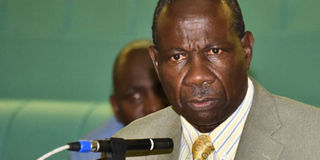Prime
COVID-19 causes Shs789 billion revenue shortfall to government

Finance minister Matia Kasaija
Government revenues suffered the hardest beating in April, falling below target by a whopping Shs789.8 billion.
This is the latest indicator of how the coronavirus has battered Uganda’s economy since March when it broke out.
According to the Ministry of Finance Performance of the Economy Report for April 2020, all the projections were below target.
In its projections, the government had hoped to receive Shs1.8 trillion but could managed to collect Shs965 billion.
The government had planned to collect Shs1.5 trillion but only managed to get Shs931 billion which means that there was a shortfall of Shs547 billion, which is one of the biggest deficit in a single month in recent times.
Although the government hoped to get 128 billion in grants (money that comes from donors to support the budget) it received Shs28 billion.
In the period under review, the government got Shs6 billion from non-tax revenue (money from other sources other than taxes like passport fees and market dues), compared the targeted Shs107 billion.
The collections in April reflect a crash in business after the announcement of a lockdown in March forcing people to close businesses while some companies fired employees or cut their salaries to survive the crisis.
In the report, the government says that import taxes had the biggest shortfall of up to Shs314 billion with companies in countries of origin or destination countries remaining closed for long periods in the month as countries struggled to control the virus.
The finance ministry said in the report that this shortfall was due to a reduction in dutiable imports during the month arising from the effects of COVID-19 on trade.
Fuel imports for example, make a key component in this sector but most fuel importers say that retail demand fell by 90 percent which stopped them from importing more fuel.
Taxes levied on goods like beer, spirits and sugar were also lower than anticipated since bars, restaurants and hotels where these are consumed most, have been closed for the last two months.
The finance report adds that direct domestic tax collections were lower than the target by Shs71.87 billion since Pay As You Earn, corporate tax, withholding tax, presumptive tax and rental income tax were lower than anticipated.
Non-tax revenue, which are usually levied on items like passports and other charges by government agencies was affected by the temporary closure of ministries, departments, and Agencies (MDAs) that offer services on which non-tax revenue is charged.
Low revenues, according to the report, means the government had to borrow for most of its activities.
According to the report, the government spent an extra Shs1 trillion more than it could collect which is – also referred to as fiscal deficit.
The government had planned for a fiscal deficit of Shs712.04 billion.
Early this month, the Uganda received a loan from the International Monetary Fund and has written to the World Bank and the African Development bank for money to cover the low revenue collections.



